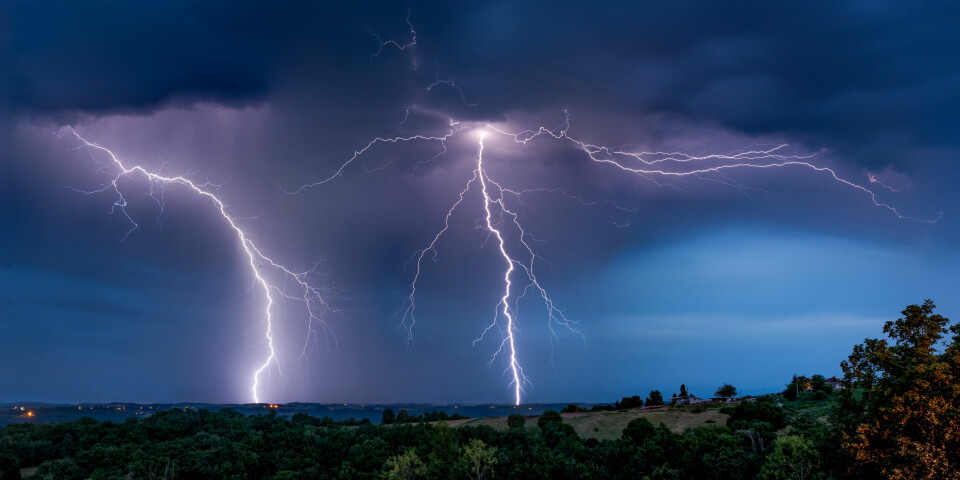Big temperature drop across France and 25,000 lightning strikes
Ferry and train delays and cancellations as Storm Pierrick brings winds of 120 km/h to Normandy for second consecutive day

The first of a series of turbulent weather changes begins today as temperatures across France fall by around 10C.
In central parts and around Paris, yesterday’s (April 8) temperatures of 23C and 24C will be replaced with highs of just 12C or 13C.
In the east along the German border, the shift could be closer to 15C.
Only the Mediterranean coast and Brittany will remain mostly unaffected, with temperatures dropping between 3C and 4C compared to the start of the week.
In Brittany and the rest of France’s western and northern coastline the storm named Pierrick is continuing to hit hard, bringing winds of 120 km/h to Normandy and high waves.
Some ferry services are facing delays due to strong winds in the English Channel.
There are 11 departments on heightened orange weather alerts due to the storm today (April 9):
Gironde, Charente-Maritime, Pyrénées-Atlantiques and Eure for river flooding.
Finistère, Côtes-d’Armor, Ille-et-Vilaine, Manche, Somme, and Pas-de-Calais for coastal waves.
Seine-Maritime is at a heightened warning for both phenomena.
Read more: What action is advised with different Météo France weather warnings
Trains cancelled, ferries delayed, public parks closed
Although Storm Pierrick dissipated across the centre and north-east of France, Brittany and Normandy are still facing the brunt of the storm.
In Brest (Finistère), parks, public gardens, cemeteries and some other outside spaces, such as sports grounds, are temporarily closed off to the public.
The SNCF announced that three local rail routes in Brittany and Normandy would be cancelled on Tuesday. These lines are:
Caen-Lison-Coutances-Granville-Rennes
Caen-Lison-Cherbourg
Argentan-Granville
High-speed services, as well as most major local routes, are still running.
If you are travelling via rail in the regions, you should check the status of your train using the SNCF connect app or website.
Some ferry routes between Dover and Calais are facing delays, however as of 09:00 there are no services that have been cancelled.
DOVER-FRANCE-DOVER | Due to forecasted high winds we regret to advise of ongoing delays on our services. However we do remain operating and will get all passengers onboard as soon as possible. Thank you for your patience. pic.twitter.com/rB7Mk50Atz
— DFDS Live Travel Updates (@DFDSLiveUpdates) April 9, 2024
Ferry passengers are also recommended to check their route in advance if travelling today.
Read more: France ‘interested’ in tunnel link with Channel Islands
25,000 lightning strikes light up French skies
Storm Pierrick made its way across France yesterday, moving in a diagonal line and battering areas across the south-west, central, and north-eastern part of France.
One offshoot of the storm continued to hit Brittany and English Channel, bringing waves recording 113 on France’s coefficient. This correlates to waves of around 5 metres, and is only a few points off last month’s ‘waves of the decade’ along the western shore.
Across France, almost 25,000 lightning strikes were recorded yesterday evening, with 3,000 of these in the Pas-de-Calais department.
🌩️Près de 25.000 #éclairs détectés au cours des 6 dernières heures en France ! L'activité électrique est particulièrement intense pour un mois d'avril depuis la fin d'après-midi. Les #orages sont parfois forts, avec #grêle et fortes rafales de vent. Suivi foudre temps réel :… pic.twitter.com/mon0MKgujM
— Keraunos (@KeraunosObs) April 8, 2024
In some areas, hail fell alongside the thunder and lightning, as well as heavy rain.
Orage supercellulaire impressionnant près de Sens pic.twitter.com/HAinAGigpD
— Etienne Farget 🌩️ (@EtienneFargetMC) April 8, 2024
If your home is struck by lightning, you will need to show your insurance provider an attestation de foudroiement (lightning certificate to claim compensation.
Read more: How do I get a ‘lightning certificate’ for French home?
You can keep up with all weather alerts using the Météo France website, and all river flooding alerts using the Vigicrues website.
Note that these are subject to frequency change during periods of unstable weather.























